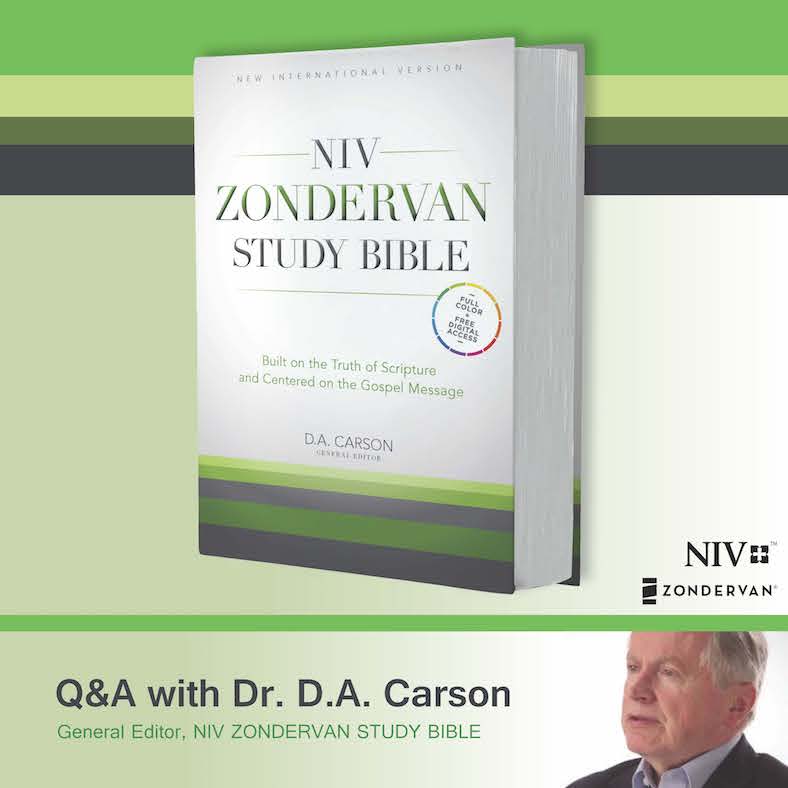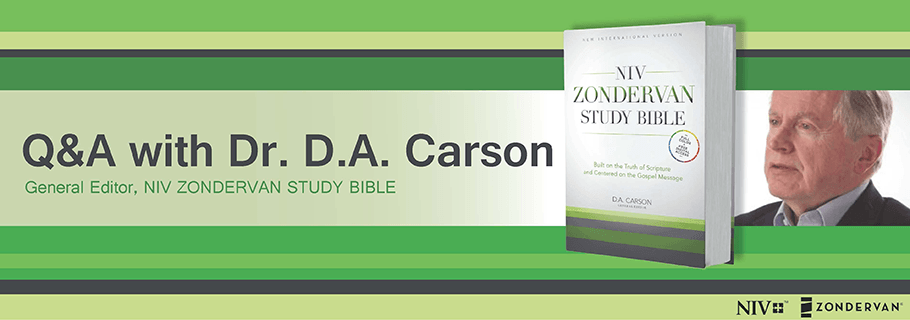This sponsored Q.A. with Dr. D.A. Carson was prepared by Zondervan for the NIV Zondervan Study Bible. Use coupon code NIVZSB50 and get the personal size for just $20 with free shipping!
Q: While the church obviously shouldn’t repeat the medieval error of restricting access to knowledge in today’s information age, pastors certainly have an obligation to guide inquisitive believers to trustworthy sources. What role could a resource like the NIV Zondervan Study Bible play in helping church leaders direct seekers into finding reliable Biblical and theological answers?
A: One of the advantages of the NIV ZSB when it comes to recommending sources to inquisitive folk who attend our churches is that the one volume contains so much. It provides something close to a commentary on the entire Bible, so whether the current series is from Psalms or Malachi or John or Jude, the NIV ZSB has useful things to say that will answer many questions. Without such a Study Bible, pastors would have to recommend a much larger array of books, most of which will not be purchased by most ordinary Christians. In addition to the notes, of course, are the maps, charts, summaries, explanatory asides, and final biblical-theological essays: a pastor who has spent a little time with the NIV ZSB will quickly see countless ways in which one part of another of this Study Bible can be usefully recommended to believers and unbelievers alike who ask questions.
Q: Study Bibles in general have a long history of taking theological concepts that have lived in theology classrooms and bringing them into the homes of church members. Biblical theology is one of those concepts that is taught in seminaries but has remained largely unfamiliar to non-academics. How can the NIV ZSB help?
A: The NIV ZSB can be used to supplement the kind of expository ministry that puts a significant emphasis on two biblical-theological features: (1) biblical exposition that emphasizes the unique contribution of each biblical book and corpus to the whole canon; and (2) biblical exposition that tracks out major themes running right through the Bible. By sometimes alluding to where such surveys are found in the Study Bible, pastors will encourage their flock to do some digging for themselves. Or again, in churches where the content of small groups mirrors what is given from the pulpit week by week, a careful assigning of appropriate readings for the small group will leverage the biblical-theological exposition of the central services.
Q: For prospective elders who may not have had the opportunity to attend seminary, how could a pastor use the two articles on getting from Scripture to theology as a hermeneutical base in elder-training?
A: Ideally, elders must not only know a fair bit of the Bible in a “bitty” sense (from their own habitual devotional reading), but must learn how one moves from the Bible to the theological structures that undergird confessionalism. Working through those essays, teased out with some examples and further assigned reading, would not only help trainee elders to move more comfortably from Bible reading to informed theological convictions, but would prepare them to train others in a similar fashion.
Q: The Bible can be a daunting book for new believers. How could an article like Tim Keller’s “The Story of the Bible” help disciple-makers give new believers a succinct framework to introduce them to the Bible?
A: Tim Keller’s overview of the Bible provides the “big picture” that helps remove from new readers what seems to be the Bible’s strangeness. To plunge right into Isaiah or Romans (or any other book) without having any serious grasp of the Bible as a whole will certainly retard the progress in understanding one might have hoped for. Tim Keller’s overview is a wonderful antidote!
Q: There are many aspects that go into a healthy discipleship ministry that include things like mentoring, prayer, fellowship, character formation, service, and, of course, Biblical and theological formation. What, in your estimation, would be the chief benefit of having a trusted, one-volume resource like the NIV Zondervan Study Bible to act as the backbone of the Biblical and theological part of a discipleship ministry?
A: If part of the aim of extensive Bible reading is understanding what one is reading, with a view to digesting it, memorizing it, discovering how the parts fit together (rather than looking for isolated precious thoughts), and ultimately conforming to the whole counsel of God, then a good Study Bible is a great tool, precisely because it provides so much needed help and information as one is reading the Bible itself.
Want your own copy of the NIV Zondervan Study Bible?
Use Coupon Code NIVZSB50 and get the personal size for just $20 with free shipping! Click here to order.











